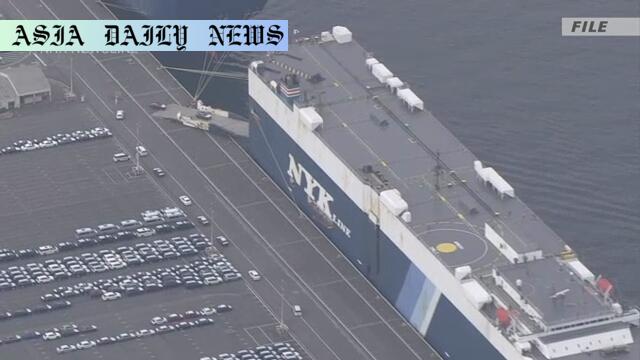Shipping firms map responses to Middle East tensions.
- Key Point 1: Japanese shipping companies are adjusting operations due to recent attacks in the Middle East.
- Key Point 2: Over 90% of Japan’s crude oil imports come through the Persian Gulf, making safe transit critical for the economy.
- Key Point 3: Companies are considering suspending or rerouting operations to ensure the safety of crews and cargoes.
- Key Point 4: Japan’s transport ministry is actively sharing updates with shipping firms to enhance safety protocols.

Introduction: Rising Tensions and Their Impact on Shipping
The recent attacks on Iran by Israel have raised significant concerns in the international shipping and energy resource sectors. For Japan, a country that depends on the Persian Gulf for more than 90% of its crude oil imports, these developments pose both logistical and economic challenges. Major Tokyo-based shipping firms, including NYK Line, Mitsui O.S.K. Lines, and Kawasaki Kisen Kaisha (“K” Line), are now strategizing ways to adapt their operations to this volatile scenario.With thousands of voyages through the Gulf annually, Japanese companies are prioritizing crew, cargo, and vessel safety. The Persian Gulf remains a vital corridor for Japan’s oil and energy transportation, with oil tankers accounting for close to 40% of the total trips. Moreover, adjustments, such as temporary service suspensions or alternate routes, are actively being considered as companies process new logistics constraints.
Japanese Shipping Firm Responses and Strategies
As one of Japan’s largest shipping companies, NYK Line operates approximately 20 oil tankers and automobile carriers in the Persian Gulf every month. Proactively, they are updating their security strategies, ensuring maritime safety in collaboration with relevant authorities. The firm is analyzing real-time geopolitical developments to make informed decisions, even considering halting operations.Similarly, Mitsui O.S.K. Lines and Kawasaki Kisen Kaisha are escalating safety alerts for vessels near the region. Their efforts include real-time monitoring and direct communication with captains and crew for situational updates. While mitigating risks, their adaptable measures demonstrate industry-wide foresight in face of political unrest.
Japan’s Transport Ministry: Supporting the Industry
The transportation ministry in Japan plays a pivotal role in assisting shipping firms. Recognizing the reliance on overseas energy supplies, they are providing the industry with constant updates and safety recommendations. Over 3,500 trips through the Gulf were documented last year, underscoring how crucial this route is to Japan’s economy. Ministries stress collaborative efforts to ensure secure practices amid challenging circumstances.Efforts extend beyond operational safety; companies aim to protect employees, guarding them from evolving risks. By building on robust safety networks and international cooperation, the goal remains uninterrupted—and secure—economic activity in difficult shipping environments.
The High Stakes of Energy Dependency
Dependence on Middle Eastern oil has long shaped Japan’s energy policies. The unpredictability of geopolitical climates in the Gulf only reinforces the demand for diversification of energy imports. Shipping companies, central to this equation, balance energy flow consistency against mounting risks to the sector’s infrastructure and personnel.In the broader context, heightened military activity could result in significant delays, increased costs from insurance surcharges, and logistical complications. This prompts Japanese firms to initiate diplomatic dialogues emphasizing the neutrality of maritime routes for peaceful economic sustenance.



Commentary
Understanding the Complex Logistics Behind Energy Security
The increasing instability in the Middle East places significant pressure on the shipping industry, especially for oil-dependent nations like Japan. The strategic decisions undertaken by Japanese firms reflect an impressive balance of precaution and innovation. With over 90% of crude oil sourced from the Persian Gulf, the stakes for maintaining safe and efficient transit routes could not be higher.One of the most striking aspects of this situation is the immediate reaction by major shipping firms, like NYK Line, Mitsui O.S.K. Lines, and “K” Line, as they address concerns through real-time analysis and precautionary strategies. Such initiatives showcase not just reactive measures but a proactive vision for industry sustainability. Their decisions underline an unwavering priority for crew safety, evidence of a people-first approach even amid economic pressures.
A Pragmatic Look at Government Collaboration
Equally commendable is the involvement of Japan’s transport ministry in keeping all stakeholders informed and safe. Such government-industry collaboration sets an example for the world. A unified approach to managing risk in high-stakes scenarios demonstrates Japan’s integrated policy designs that align operational logistics with national interests.Future Implications on Global Trade Routes
Ultimately, the ripple effect of these tensions extends beyond Japan. Persistent unrest in the Gulf could destabilize broader global shipping networks and raise energy costs worldwide. This underscores the need for countries dependent on similar resources to reevaluate their supply chains, enhance alternative strategies like LNG diversification, or strengthen green energy investments. Japan’s immediate response to the Gulf conflict exemplifies its industrial resilience and adaptability in unpredictable times.